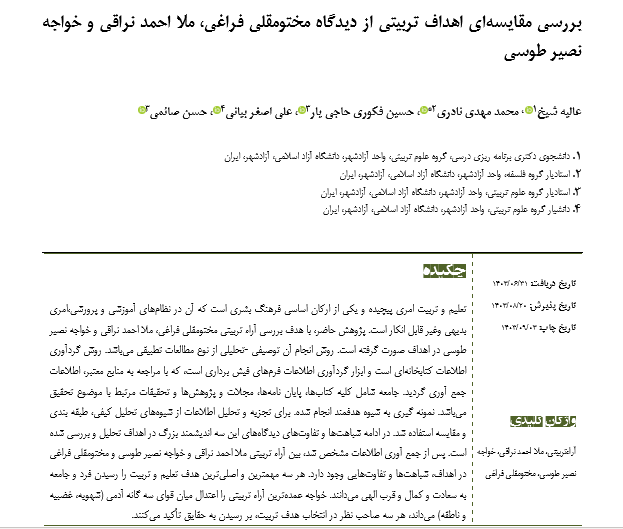Comparative Study of Educational Objectives from the Perspective of Makhtumkuli Faraghi, Molla Ahmad Naraqi, and Khwaja Nasir al-Din Tusi
Keywords:
Educational views, Molla Ahmad Naraqi, Khwaja Nasir al-Din Tusi, Makhtumkuli FaraghiAbstract
Education is a complex endeavor and one of the fundamental pillars of human culture, evident and undeniable within educational systems. The present study aims to investigate the educational views of Makhtumkuli Faraghi, Molla Ahmad Naraqi, and Khwaja Nasir al-Din Tusi with a focus on their objectives. The research method is descriptive-analytical and belongs to the category of comparative studies. Data collection was conducted using library research, and data recording forms were utilized as tools for gathering information. Information was collected through reference to credible sources. The population includes all books, theses, journals, and studies related to the research topic. Sampling was performed purposively. Qualitative analysis, classification, and comparison methods were employed for data analysis. Subsequently, the similarities and differences in the perspectives of these three prominent thinkers regarding educational objectives were analyzed and evaluated. After data collection, it was found that there are similarities and differences in the educational perspectives of Molla Ahmad Naraqi, Khwaja Nasir al-Din Tusi, and Makhtumkuli Faraghi regarding objectives. All three regard achieving individual and societal prosperity, perfection, and proximity to God as the primary and most significant goal of education. Khwaja emphasizes the balance between the three human faculties (desire, anger, and intellect) as the cornerstone of his educational views. All three emphasize attaining truth as a central aim in selecting educational objectives.
Downloads
References
Kardan AM, Araafi A, Pakseresht MJ, Hosseini AA, Irani H. Philosophy and Education (Vol. 1): SAMT Publications;
Sarli Z, Garzin A, editors. The Role of Education in Preventing Cultural Harm2022; Tehran.
Norouzi RA, Atefatdoust H. Ethical Education: A Comparative Study of Khajeh Nasir al-Din Tusi and Kohlberg.
Spring. 2011;2(2).
Tarkhan S, Shadigo S, Ahmadi MA, Niyasadeq FZ, editors. The Status and Role of Education with Emphasis on
Islamic Teachings2022; Tehran.
Naderi MM, Qarasoofloo B, Damercheli M, editors. Philosophical Foundations of Education with an Overview of
Sadighins’ Educational Thoughts2013; National Conference on Islamic Education.
Abyar S, Dehbashi M, Va'ez SH. A Comparative Study of the Ethical System and Religious Ethics Foundations from
the Perspectives of Khajeh Nasir al-Din Tusi and Jalal al-Din Davani. Journal of Jurisprudence and History of Civilization.
;4(4):44-34.
Saberi Y, Naderi MM, Abdolhosseini H, editors. Reflection of Divine Unity in the Poems of Makhtumqoli Faraghi
and Its Comparative Study with the Quran and Nahj al-Balagha2017; International Conference on Comparative Literature.
Kalbasi HH, Allahian M, Mehrabi E. A Comparative Study of Aristotle's Ethical Thought and Khajeh Nasir al-Din
Tusi. Philosophy of Religion. 2016;13(3).
Kazemzadeh Iranshahr H. The Basic Principles of Education: Eqbal Publications; 1978.
Zahedi M. Islamic Educational Theory: Sabereh Institute; 2006.
Ahmad Abadi Arani N, Farmahini Farahani M, Rahnama A. Explanation of the Educational Opinions of Molla Ahmad
Naraghi. Research in Islamic Educational Issues. 2013;21(18):93-111.
Khajeh Nasir al-Din T. Description of the Honorable Attributes (Osaaf al-Ashraaf). First Edition: Imam Publications;
Kiani S, Bakhtiar Nasrabadi H. The Goals, Principles, and Methods of Ethical Education from Khajeh Nasir al-Din
Tusi’s View. Research in Islamic Educational Issues. 2011;19(12).

Downloads
Published
Submitted
Revised
Accepted
Issue
Section
License
Copyright (c) 2024 Journal of Study and Innovation in Education and Development

This work is licensed under a Creative Commons Attribution-NonCommercial 4.0 International License.










